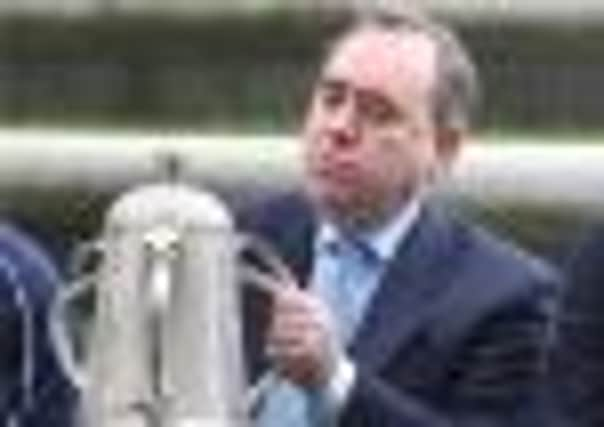Alex Salmond in formal complaint over BBC Calcutta Cup ‘snub’


The First Minister’s move follows a meeting with the chairman of the governing body, Lord Patten, who told him it would be “legitimate” for him to take the step.
Lord Patten said it was not in “anyone’s interest” to have incidents such as the row that saw Mr Salmond use the term “Gauleiter” – the name for a regional Nazi party leader – to describe BBC political adviser Ric Bailey, after the SNP leader was blocked from appearing on a sports show ahead of the Six Nations clash between Scotland and England.
Advertisement
Hide AdAdvertisement
Hide AdMr Salmond said submitting a complaint would be a “very helpful way to progress”, and the SNP administration would now send a dossier to the BBC highlighting concerns about the “way the independence debate had been portrayed” in broadcasts, with what he said was “extraordinary language”, such as “separatism” and talk about “breakaways” from the UK.


Lord Patten’s intervention followed talks with Mr Salmond at Holyrood yesterday, where the BBC Trust chairman also promised to discuss new “ground rules” for coverage of the independence referendum, amid SNP concerns about the corporation’s coverage of the run-up to the vote.
Former Conservative Party chairman Lord Patten said he would “adjudicate” over the complaint on the dispute that saw Mr Salmond excluded from the broadcast, after a judgment was made by BBC officials that the Scotland-England match was not an appropriate setting in which to give one single political leader “that level of prominence”.
A spokesman for the First Minister said the “implication is that politicians can’t be on sports-related outputs” – a move that would mean Mr Salmond would be unable to appear on TV and radio coverage of the 2014 Commonwealth Games in Glasgow and the Ryder Cup at Gleneagles during the same year.
The spokesman said that Mr Salmond now wanted “absolute clarity” about the appearance of political leaders on broadcasts to discuss sport, after Prime Minister David Cameron was yesterday “quoted extensively” on the BBC during coverage about the resignation of the England football manager, Fabio Capello.
Lord Patten, who served as the governor of Hong Kong and is a former Tory Cabinet minister, said the formal complaint route was a way of tidying up the row.
He said: “The First Minister has a specific complaint about the Calcutta Cup and the way his non-interview was handled. I’ve suggested that he should make a proper, formal complaint, or rather the government perhaps should on his behalf.
“It will eventually come to us at the trust to adjudicate on. I think that is the way in which we can deal with that.
Advertisement
Hide AdAdvertisement
Hide Ad“It’s not in anyone’s interests that we get incidents like the Calcutta Cup one every week.
“The First Minister has a complaint to make, and it’s legitimate that he put that to us.”
The talks were held on the same day as Mr Salmond faced fresh calls at First Minister’s Questions to apologise for the Nazi jibe, with Scottish Conservative leader Ruth Davidson claiming that the SNP leader was embroiled in a “petty sideshow” over the row.
Mr Salmond said: “On the specific issue of Murrayfield and what Lord Patten described as the non-interview, it was suggested that we take that to a specific complaint. That’s a very helpful way to progress.”
Lord Patten had also promised to hold talks with the BBC director-general, the Scottish Government and the opposition parties at Holyrood surrounding the “rules of engagement” on how the referendum would be covered by the broadcaster.
He said: “We agreed it was important for us to agree with the First Minister’s party and others the terms of engagement in dealing with issues in the run-up, not only to the local elections, but to the referendum in a couple of years’ time.
“I’ll be discussing how we can best do that with the director-general of the BBC.
“The First Minister put some serious concerns he had about the balance of our reporting of the referendum issue and other issues associated with it, which we will look at with the executive of the BBC.”